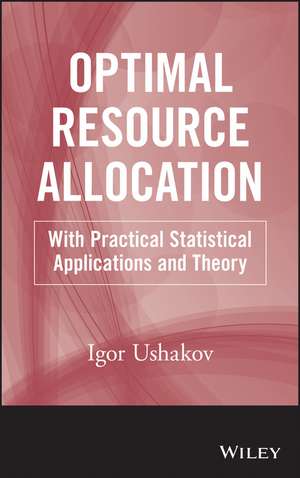Optimal Resource Allocation – With Practical Statistical Applications and Theory
Autor IA Ushakoven Limba Engleză Hardback – 16 mai 2013
Preț: 506.27 lei
Preț vechi: 740.65 lei
-32% Nou
Puncte Express: 759
Preț estimativ în valută:
96.89€ • 99.95$ • 82.00£
96.89€ • 99.95$ • 82.00£
Carte indisponibilă temporar
Doresc să fiu notificat când acest titlu va fi disponibil:
Se trimite...
Preluare comenzi: 021 569.72.76
Specificații
ISBN-13: 9781118389973
ISBN-10: 1118389972
Pagini: 256
Dimensiuni: 161 x 236 x 24 mm
Greutate: 0.52 kg
Editura: Wiley
Locul publicării:Hoboken, United States
ISBN-10: 1118389972
Pagini: 256
Dimensiuni: 161 x 236 x 24 mm
Greutate: 0.52 kg
Editura: Wiley
Locul publicării:Hoboken, United States
Public țintă
As a textbook for courses in reliability theory and optimization at graduate and PhD levels for students majoring in statistics, mathematics, operations research, and engineering; as a reference guide for professionals and researchers working in industry who seek a mathematical review of reliability models, optimization, quality and productivity, and the relevant mathematical and statistical applications; as a reference for secondary educators; and academic and corporate libraries.Cuprins
Notă biografică
IGOR USHAKOV, DrSci, was previously a professor at both The George Washington University and the University of California, San Diego; chair of the Department of Large Scale Systems at the Moscow Institute of Physics and Technology; and a principal engineer at Qualcomm. In addition, he is founder of the International Group on Reliability's Gnedenko Forum and has authored or edited dozens of books and published more than 300 journal papers on reliability engineering, logistics, and quality assurance.
Descriere
A UNIQUE ENGINEERING AND STATISTICAL APPROACH TO OPTIMAL RESOURCE ALLOCATION Optimal Resource Allocation: With Practical Statistical Applications and Theory features the application of probabilistic and statistical methods used in reliability engineering during the different phases of life cycles of technical systems.
